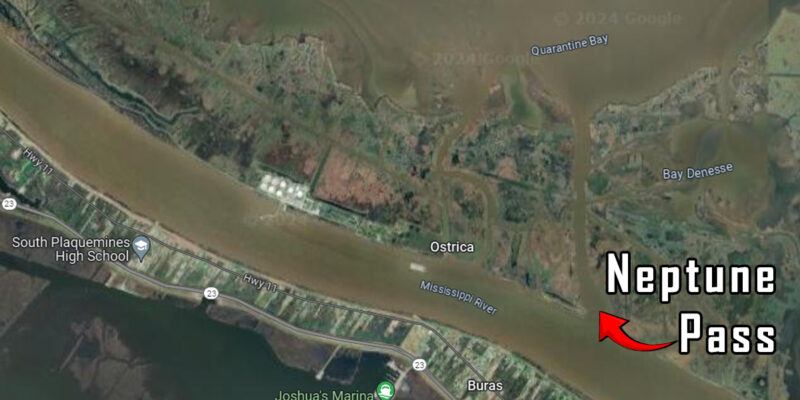Last week, Fox 8 in New Orleans ran a report by John Snell talking about what’s happening in the marsh near the mouth of the Mississippi River, as a new waterway called Neptune Pass has created a natural diversion project.
For free.
Along a stretch of the Plaquemines Parish east bank, the Mississippi River is providing what coastal activists see as a no-cost coastal project.
In recent years, the river has plowed through its bank and transformed a tiny channel into the equivalent of one of the ten largest rivers in the U.S.
Neptune Pass is taking an estimated 16 percent of the Mississippi River flow during high water periods, according to Corps hydrologists.
In the process, groups active in the fight to restore Louisiana’s coast argue the river is providing a practically no-cost diversion.
“It is a restored ecosystem happening for free before our eyes,” said James Karst, Director of Communications and Marketing for the Coalition to Restore Coastal Louisiana.
Neptune Pass, they say, is depositing sediment and creating new sections of delta in both Bay Denesse and Quarantine Bay.
Not everyone is thrilled at the prospect of nature taking its new course.
Shipping interests complain the pass has already affected navigation, causing the slower-moving river downstream to build sandbars.
The Corps, which initially had planned to close the channel entirely, now envisions a dual purpose for Neptune Pass.
A draft environmental assessment envisions a two-part approach to protecting the integrity of the main river channel: a stone sill at the water bottom with a 100-foot-wide notch to reduce the outflow from the river; and 20 V-shaped mounds to further reduce the velocity of the water moving into Quarantine Bay.
The Sediment Retention Enhancement Devices, or “SREDS” as the Corps calls them, would be built of earthen material, geotextile fabric, and stone riprap.
“We allowed an opening to allow river flow and sediments to leave the river and deposit in the bay, in the receiving area,” said David Ramirez, a Corps hydrologist.
Most of the “new” land that Neptune Pass has created is simply displaced land that the new waterway has carved away, but about a third of it is actual new land where river sediment has built up and created marshland out of open water.
This is a cool story, but it serves as evidence of something we’ve been saying from the beginning of this site’s existence, which is that the climate change alarmist wackos who have feverishly attributed Louisiana’s coastal loss to global warming and sea level rise are dead wrong – to be charitable – or, more accurately, flat-out lying.
The coast of an alluvial area like South Louisiana is simply the front line of a geological battle between rivers depositing sediment along their deltas and the ocean scouring away that land. Typically speaking, the river will win – where it’s fighting the battle.
But rivers change their course, and areas where the delta depends on fresh sediment being dumped in the river’s spring floods won’t survive to fight off the ocean when the river no longer flows over the land.
And when you levee a river to its mouth, as the Army Corps of Engineers has done to the Mississippi, that delta will be starved of sediment and it will ultimately be reclaimed by the ocean.
Which is the reason why southeastern Louisiana has seen a massive amount of land loss in the past 100 years while the central and southwest Louisiana coast is seeing a significant growth of new land owing to the sediment being dumped out by the Atchafalaya River, which is not hemmed in by levees.
Advertisement
Hydrologists have known this for quite some time, and that’s why they’ve been punching holes in the Mississippi River levees for years to create diversion projects. Turns out that those work.
Of course, those projects are bad for things like oyster fishing, so every time there’s a new one the oystermen lose their minds. Still, the main point remains – South Louisiana isn’t falling into the Gulf of Mexico because of global warming and sea level rise. There is no appreciable sea level rise, and all that Al Gore stupidity about how New York will be under 20 feet of water because the ice caps are melting is just that, stupidity.
The loss of land due to marshes starved of sediment is a real problem for which there are real solutions, and it’s worth our while to design and implement those.
Maybe, just maybe, we’ll see some headway in getting the global warming weirdos to shut up so the adults can tackle the coastal erosion problem. Junk science and communist propaganda narratives don’t generally fix anything, you know.
Advertisement
Advertisement

